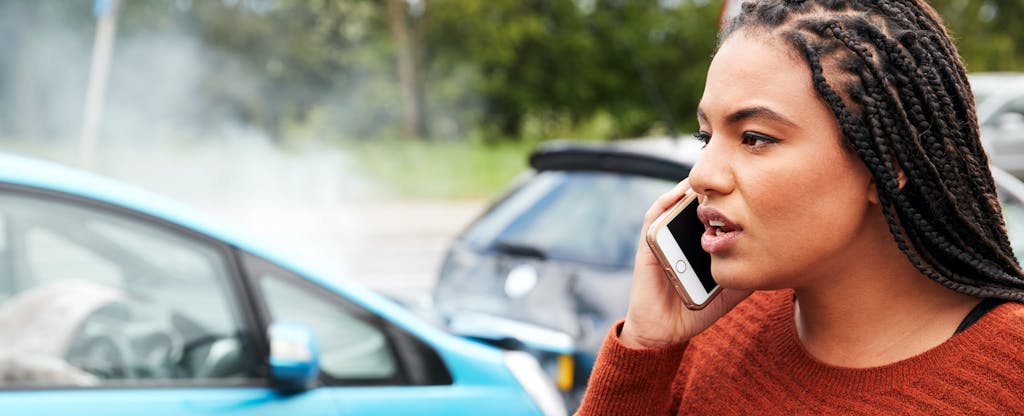In a Nutshell
An insurance company generally considers a car totaled when the cost of repairs is more than the vehicle is worth. Depending on how your car is totaled and the types of auto insurance coverage you have, your insurance company may reimburse you for the current value of your car (minus your deductible). And if you’re in an accident caused by another driver, their insurance may pay you.Totaling a car can be a scary — and expensive — situation.
A car accident can be someone’s fault or just plain bad luck, like if a tree falls on your vehicle. But no matter how it happens, a totaled vehicle can be a real pain.
If your vehicle is totaled, one of your first questions is probably how you’ll get a new one and whether insurance will cover the loss. While the answer varies from one situation to another, one thing is clear: A solid auto insurance policy can help get you back on the road while protecting your finances.
Let’s take a look at how insurance companies decide whether a vehicle is a total loss, how you might be protected and whether you can expect to pay out of pocket if your car is totaled.
- What does it mean when your car is totaled?
- Will my car insurance cover my totaled car?
- Do I still have to make payments on a totaled car?
What does it mean when your car is totaled?
Your vehicle can be damaged — and even totaled — in many different ways.
There are collisions, which occur when your car strikes another vehicle or object, like a deer or even a tree. Collisions can involve one car or many.
Cars can also be damaged in non-collision situations. These include weather events, like big hailstorms and floods, fire, vandalism or falling objects.
No matter how your car is damaged, you’ll need to file a claim with your auto insurance company if you’re hoping to get the loss covered. Your insurer will send out an adjuster who will inspect your vehicle’s damage and estimate the cost to repair it.
A vehicle is considered totaled if the cost to repair it is estimated to be more than its current value. When this happens, insurance companies may declare the car a total loss, according to how your state defines a total loss.
For example, some states, such as Alabama and Kansas, may only require that the damage equals 75% of the vehicle’s value in order to be declared a total loss. So if you live in one of these states and your car is worth $10,000 and repairs are estimated to cost $7,500, your insurance company would declare it a total loss.
Will my car insurance cover my totaled car?
If your car has been declared a total loss, your biggest concern — assuming that everyone involved is OK — may be how you’ll replace your car and whether insurance will cover it. And that depends on your auto insurance coverage and how your vehicle was totaled in the first place.
If you were in an accident where another driver is found at-fault …
If the other person has property damage liability coverage, it will likely help cover your loss, up to the driver’s coverage limits.
If your car is badly damaged by weather, vandalism, fire, an animal or a falling object such as a tree …
Your comprehensive coverage (if you have it) may pay the actual cash value, or ACV, of your vehicle minus the deductible on your policy. To determine your car’s ACV — essentially, its fair market value — your insurance company will take into account factors such as your vehicle’s age, mileage and condition as well as the cost of similar cars in your market.
Some auto insurance companies also offer what’s called new-car replacement coverage. If your vehicle is totaled, this coverage may give you the money to purchase a brand new car of the same make and model versus reimbursement for your car’s current value.
If your car is totaled following a collision, such as hitting another vehicle or object or being involved in a rollover …
Your insurer may pay the actual cash value of the vehicle minus your policy deductible if you have collision coverage.
Note that comprehensive and collision coverage are optional for drivers, but they may be required if you finance or lease your vehicle. If you own your car and don’t have either coverage, you may not be protected in certain situations if your vehicle is totaled.
Do I still have to make payments on a totaled car?
You’ll have to continue making payments on your vehicle, even if it gets totaled.
Once your total loss claim is settled, your insurance company may issue a claim check made out to both you and your lender, with funds going toward your remaining auto loan balance first.
But what if you owe more to your lender than you receive from the insurance company? In that case, you’ll still be responsible for the remaining balance, which will need to come out of your own pocket. To prevent this situation from happening, you may want to consider purchasing guaranteed asset protection, or gap, coverage.
Gap insurance can pay the difference between the value of your vehicle and what you still owe on the car loan or lease. This coverage can help you avoid a hefty out-of-pocket expense if your vehicle is totaled while you’re still paying it off.
What’s next?
Don’t wait until your vehicle is totaled to start thinking about whether your auto insurance coverage adequately protects you. Even if you don’t finance or lease your vehicle, you may still consider getting comprehensive and collision coverage. These can offer you added financial protection — especially if your car gets totaled.
If you aren’t sure which types of insurance coverage you currently have, take a look at your policy or contact your insurance agent or company.


